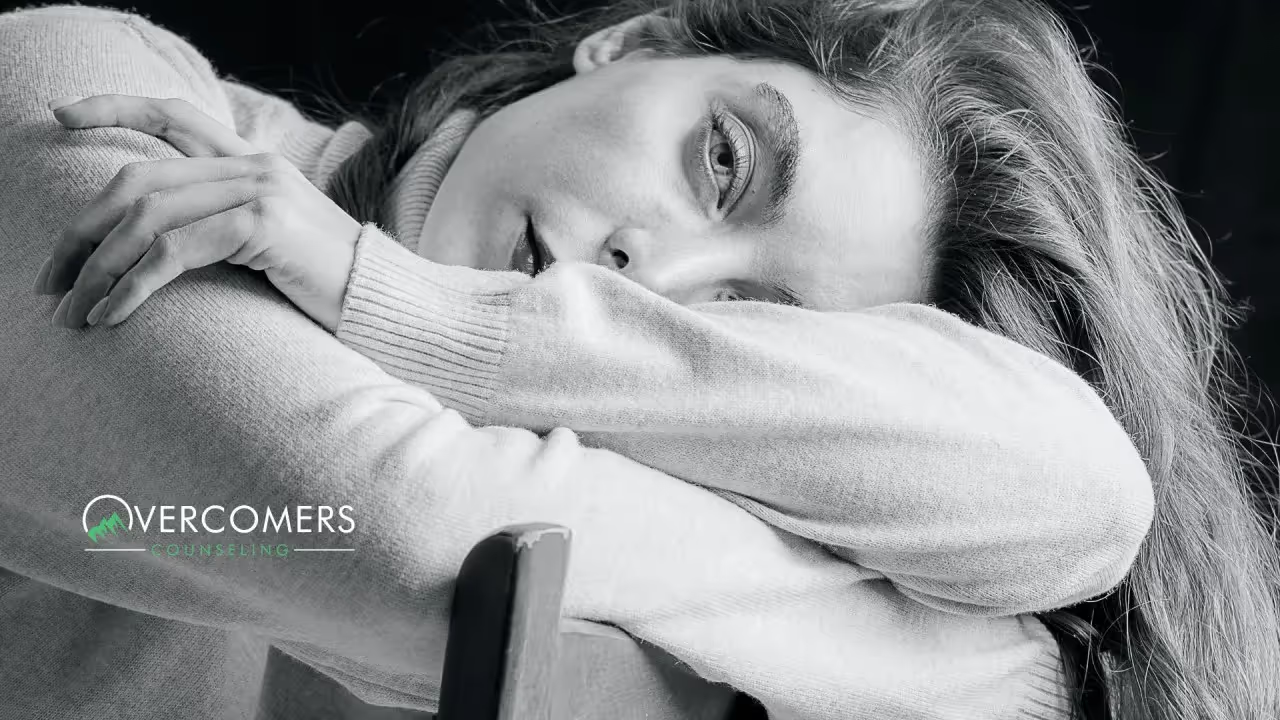Imagine standing at the edge of a diving board, peering down into crystal clear waters. You want to jump, but your heart races, your palms sweat, and your...

Imagine standing at the edge of a diving board, peering down into crystal clear waters. You want to jump, but your heart races, your palms sweat, and your mind swirls with a thousand 'what ifs'.
That's what anxiety can feel like—a constant state of apprehension that keeps you frozen in place when all you want to do is leap.
Anxiety is not just an emotion; it's a complex psychological condition that can weave its web around every aspect of your life, often hindering you from doing things you would otherwise enjoy or need to do.
Yet, while it may cast a large shadow, it's important to remember that it is not invincible. Understanding anxiety, its manifestations, and its impacts, is the first step towards shining a light on this shadow and reclaiming the joy and freedom that lies beyond it.
Anxiety, at its core, is more than just a simple case of nerves. It's a multifaceted condition characterized by excessive, often debilitating worry and fear.
This isn't the type of fear you experience when watching a horror movie or standing on the edge of a tall building—it's a chronic, persistent feeling of dread that can make everyday tasks seem insurmountable.
Anxiety is not a choice or a sign of weakness; it's a serious mental health condition that affects millions of people worldwide.
There are several types of anxiety disorders, each with their own unique manifestations. Generalized Anxiety Disorder (GAD) is marked by continuous, often unwarranted worry about everyday life.
Panic disorder is characterized by recurring, unexpected panic attacks—intense bouts of fear accompanied by physical symptoms like a pounding heart, shortness of breath, or dizziness.
Social anxiety disorder involves a profound fear of social situations, leading to avoidance and feelings of embarrassment or self-consciousness.
Specific phobias revolve around an intense, irrational fear of a particular object or situation, such as spiders or flying.
Each of these disorders is united by common symptoms, including restlessness, difficulty concentrating, and sleep issues.
Understanding these different types and their symptoms is crucial in comprehending the complexities of anxiety.
Anxiety's influence on the human body and brain is nothing short of remarkable, if not somewhat sinister. When anxiety takes hold, it triggers a cascade of responses within our nervous system.
The brain, acting as the command center, releases adrenaline and cortisol, alerting our bodies to perceived threats and preparing us for fight or flight. However, this response, while useful in genuinely dangerous situations, can wreak havoc when activated repeatedly by anxiety.
Chronic stress and pathological anxiety can lead to structural changes in the brain, particularly in the hippocampus and prefrontal cortex, impairing their functioning over time.
This physiological response to anxiety is not just an abstract concept—it has tangible effects on people's lives. Consider, for example, a talented musician who suffers from severe performance anxiety.
Despite her skill and passion for music, the mere thought of playing in front of an audience sends her brain into overdrive, flooding her body with stress hormones. Her heart races, her palms sweat, and she feels an overwhelming urge to flee.
This fear becomes so crippling that she starts to turn down opportunities to perform, her anxiety dictating her actions.
Anxiety often triggers a cycle of fear and avoidance. As in the case of our musician, the fear of a situation (performing) leads to avoidance (turning down opportunities), which in turn reinforces the fear. It's a self-perpetuating cycle that can feel impossible to break free from.
Anxiety's impact stretches far beyond the confines of the mind—it permeates every aspect of our lives, leaving a trail of disruption in its wake.
Mentally, anxiety can lead to difficulties with concentration, memory, and decision-making, often resulting in decreased productivity and performance in work or school settings.
Physically, chronic anxiety can manifest as a host of symptoms, including headaches, muscle tension, fatigue, and insomnia.
It can also increase the risk of developing certain health conditions, such as heart disease and gastrointestinal problems. Socially, anxiety can cause withdrawal and isolation as individuals may avoid social situations for fear of judgment or embarrassment.
Over time, this can lead to strained relationships and a decreased sense of belonging.
The prevalence of anxiety disorders in society is staggering. According to the Anxiety and Depression Association of America, anxiety disorders are the most common mental illness in the U.S., affecting 40 million adults, or 18.1% of the population, every year.
Globally, the World Health Organization reports that around 264 million people live with an anxiety disorder. These statistics underscore the widespread impact of anxiety on individuals and societies alike, highlighting the urgent need for increased awareness, understanding, and access to effective treatments.

Cognitive-Behavioral Therapy (CBT):
This form of psychotherapy is designed to assist individuals in recognizing and altering thought cycles that result in detrimental behaviors or anxiety feelings.
Through CBT, individuals can learn to identify their fear triggers, challenge negative thought patterns, and respond to situations in more effective ways.
Mindfulness and Meditation:
These practices can help individuals focus on the present moment, rather than worrying about the future or dwelling on the past. Mindfulness and meditation can promote relaxation and decrease the physiological symptoms of anxiety.
Exercise:
Regular physical activity boosts the production of endorphins, the body's natural mood lifters. It also promotes better sleep, reduces stress, and improves self-confidence.
Healthy Eating:
Certain foods may contribute to anxiety. Limiting caffeine and sugar, increasing intake of omega-3 fatty acids (found in fatty fish, walnuts, and flaxseeds), and maintaining a balanced diet can have a positive effect on anxiety levels.
Sleep Hygiene:
Poor sleep can exacerbate anxiety symptoms. Preserving healthy sleep habits, including adhering to a consistent sleep routine, cultivating a tranquil environment, and avoiding caffeine and electronic gadgets prior to sleep, can enhance the quality of your slumber and alleviate anxiety.
Support Groups:
Sharing experiences and coping strategies with others who are experiencing the same struggles can provide emotional support and shared coping strategies.
Self-Care:
Taking time each day for relaxation and enjoyable activities can reduce anxiety by taking the mind off stress and providing a sense of control and pleasure.
Professional Help:
If anxiety becomes overwhelming or unmanageable, seeking help from a mental health professional can be a crucial step in recovery.
Understanding the intricate dance between anxiety and our actions is a vital step towards reclaiming control over our lives.
No doubt, anxiety can be a formidable foe, halting us in our tracks and dictating our decisions. But, remember, it doesn't have to be the author of your story.
Each coping mechanism—be it cognitive behavioral therapy, medication, or lifestyle changes—offers a beacon of hope, a way to rewrite the narrative.
If you're grappling with anxiety, know that you're not alone. There's a world of support out there, from therapists to support groups and self-care strategies.
You hold the pen. You have the power to turn the page and start a new chapter. The journey may not always be easy, but rest assured, every step you take is a step towards a happier, healthier, more fulfilling life.
Other activities which have been found helpful in reducing both immediate feelings of anxiousness and long-term anxieties associated with chronic disorders include yoga, journaling, nature walks, art therapy, volunteering, and other low-stress activities. Additionally, developing a healthy lifestyle incorporating adequate sleep, physical activity, and nutritious meals can help reduce overall stress levels.
Ignoring anxiety can exacerbate symptoms and make it more challenging to manage over time. This can result in a negative impact on your personal, professional, and social life, leading to feelings of isolation and even depression.
It's important that you feel comfortable discussing personal matters with your therapist in order to open up and get more out of therapy sessions; therefore finding someone who meets certain criteria like experience level, expertise areas, and personality is key when selecting a therapist who can give meaningful feedback about how best handle issues related to anxiety or other mental health concerns.
To reduce your anxiety, you can practice relaxation techniques such as deep breathing, progressive muscle relaxation, guided imagery, and mindfulness practices. Additionally, regular exercise has been found to be beneficial in managing stress and improving mental health.
Yes, Medicaid provides insurance coverage for therapy services specifically designed to help individuals struggling with anxiety, depression, and other mental health conditions.
The duration of anxiety counseling varies for each individual, depending on the severity of their anxiety and their progress in therapy. Our therapists will regularly assess your progress and adjust your treatment plan as needed.